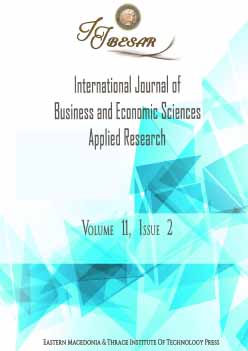Service quality in local government and its effect on citizen satisfaction: The case of the Division of Transportation and Communications of the Regional Unit of Kavala in the region of Eastern Macedonia and Thrace, Greece
Service quality in local government and its effect on citizen satisfaction: The case of the Division of Transportation and Communications of the Regional Unit of Kavala in the region of Eastern Macedonia and Thrace, Greece
Author(s): Thomai Karagianni, Georgios TheriouSubject(s): Economy, Governance, Public Administration, Communication studies
Published by: Τεχνολογικό Εκπαιδευτικό Ίδρυμα Ανατολικής Μακεδονίας και Θράκης
Keywords: Local Government; Public Services; Service Quality; Customer Satisfaction; Citizen Satisfaction; SERVQUAL method;
Summary/Abstract: Purpose: This study aims to assess the degree of satisfaction regarding service quality provided by the Transportation and Communications Division of the Regional Unit of Kavala, Greece. The main purpose of the study is accomplished through the development and the empirical testing of a conceptual framework. Design/methodology/approach: The present study adopted the SERVQUAL approach (model). The proposed conceptual framework was tested on a random sample of citizens visiting the Transportation and Communications Division of the Regional Unit of Kavala, Greece for personal affairs. The final sample consisted of 302 citizens. The reliability and the validity of the questionnaire were thoroughly examined. Empirical data were analyzed using the “Structural Equation Modelling” (SEM) technique. The present study is empirical, explanatory, deductive and, mainly quantitative. Findings: Empirical results indicate a moderate performance of service quality for the division in all dimensions of the SERVQUAL model. This does not appear to cause discontent among citizens, but certainly, it also does not provide any satisfaction. Regarding the examination of the conceptual framework, all dimensions impact citizen satisfaction with the exception of Reliability. Empathy seems to be a crucial factor in satisfaction. A revised conceptual framework is proposed with new indirect relationships. The explanatory power of the revised research model is extremely satisfying, quite accurately describing the determinants of citizen satisfaction regarding the services offered by the Division of Transportation and Communications of the Regional Unit of Kavala, Greece. In the revised conceptual framework, the dimensions of SERVQUAL model are not independent, since the four dimensions that have a statistically significant effect on Satisfaction (Empathy, Responsiveness, Tangibles and Reliability) form a network of relations and interdependencies. Research limitations/implications: A limitation stemming from the implemented methodology is the use of self-reported scales for the measurement of the six research factors. Moreover, the empirical research (survey) is focused on one organization and, therefore, offers relatively limited generalizability. Originality/value: Very few studies have utilized the SERVQUAL approach in the context of an explanatory research in the public sector or public services.
Journal: International Journal of Business and Economic Sciences Applied Research (IJBESAR)
- Issue Year: 11/2018
- Issue No: 2
- Page Range: 7-16
- Page Count: 10
- Language: English

